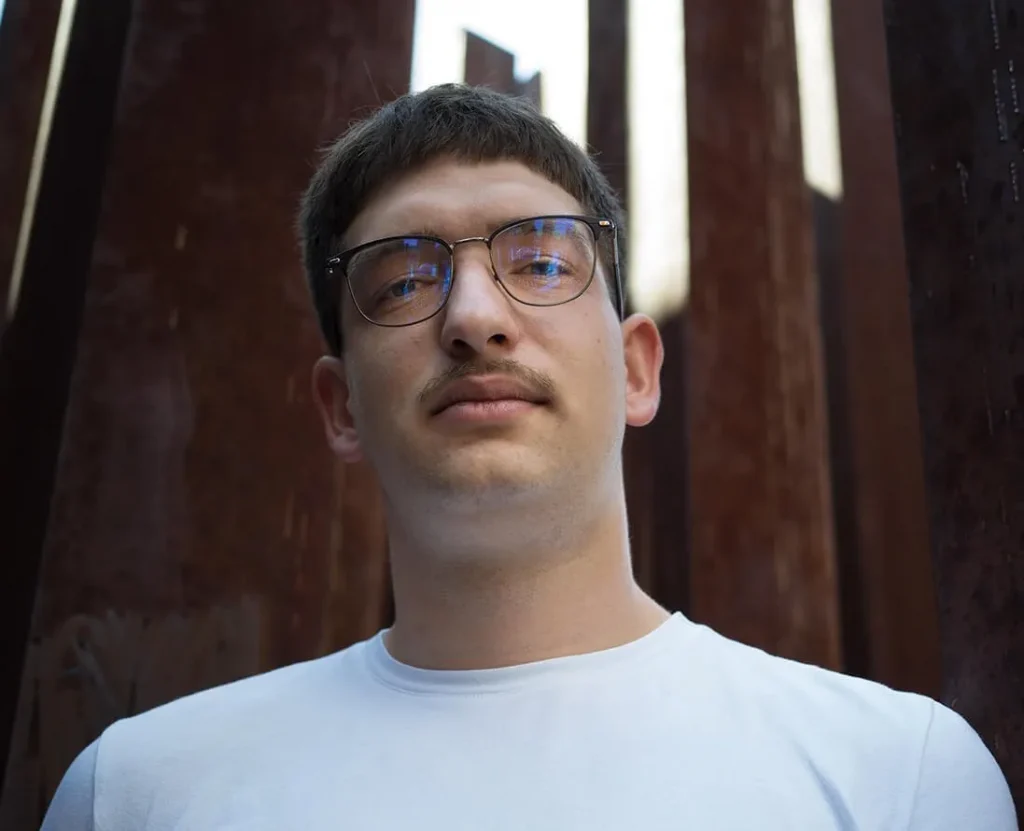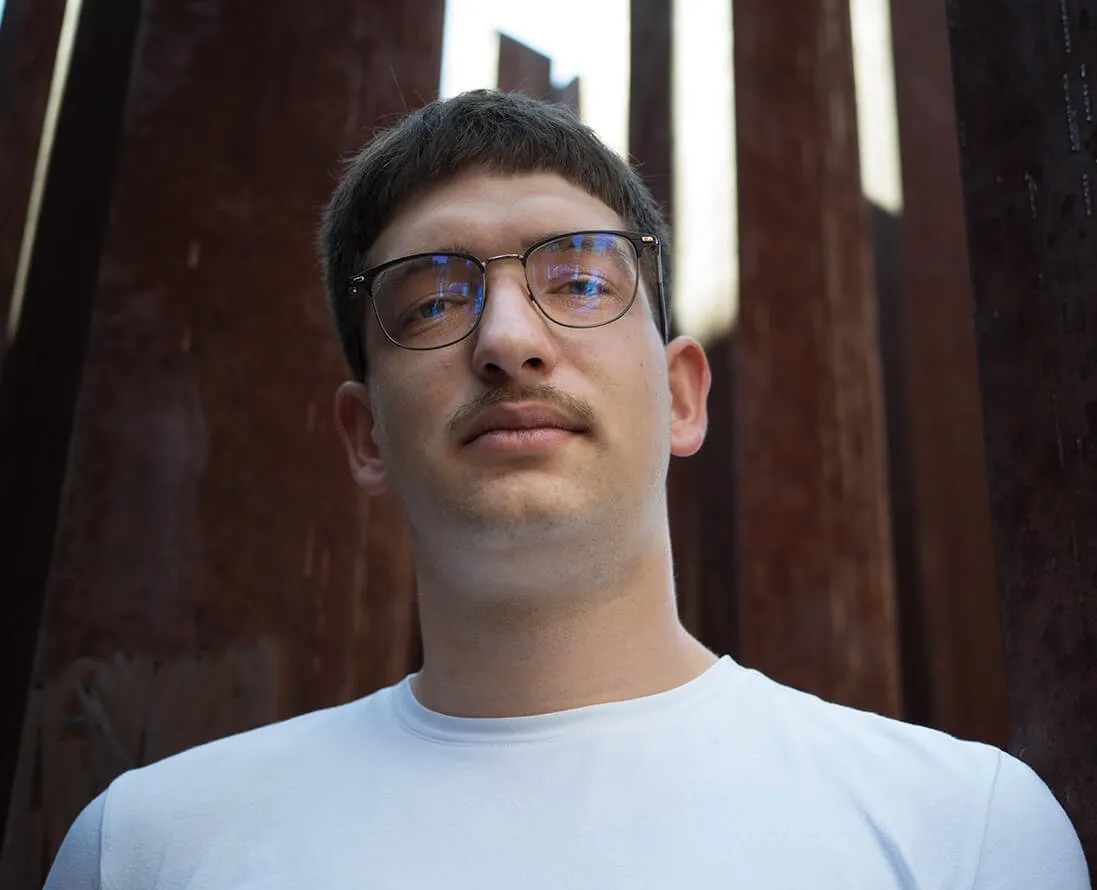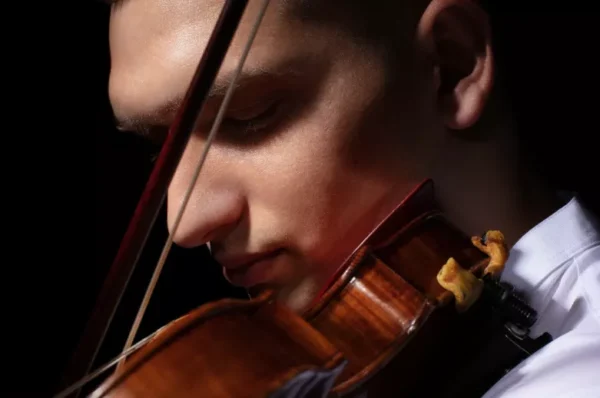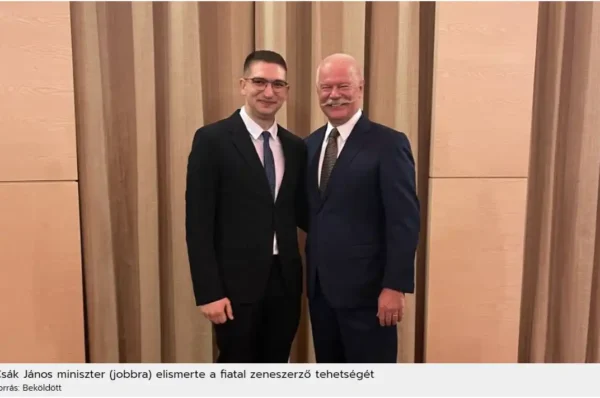
Patrik Oláh is a true Generation Z young man, born in 1998 in Salgótarján, lives in Budapest, can be passionate about contemporary and gypsy music at the same time, composes music, and is all about kickboxing. Is it a problem if we suddenly win a lot of classical music competitions? How can Azahriah’s name come up in a contemporary music interview? When will the first opera in the Lovran language be ready? Before its French premiere, we caught up with the junior classical music composer of the year on the Paris-Budapest axis.
D+SZ: My first experience with you was your Sziget performance on the Main Stage in 2019.
Patrik Oláh: Yes? (laughs) I received an invitation from the Sziget organizers to collaborate with an American dancer in the Human Rights program. He dances, I play the violin. I hadn’t played the violin for a few years, but they needed someone who played the violin but was also a composer, could improvise and who dared to stand in front of an audience of tens of thousands. That’s how I came into the picture. We spoke out against bullying at school.
D+SZ: You were 21 years old at the time.
OP: Yes, one of the greatest experiences of my life!
D+SZ: At seven years old, we typically don’t have a vision of the future to actually decide what we want to do. You had already decided then that you would become a composer, but when was the point when you really started going in that direction?
OP: I played a Vivaldi piece for the first time when I was seven or eight years old, and I thought, well, I want to write things like that. That’s how it started.
D+SZ: You were in your Baroque period.
OP: Yes! (laughs) It went on like that until I was twelve, when I got into romanticism and fell in love with Tchaikovsky’s music. From then on, I started writing pieces of this kind, and then came my Liszt era. Back then, as a violinist, I thought I would become a piano or violin virtuoso, but I would definitely write pieces like this. In the convent, I got a taste of twentieth-century music, which is a spiral that I don’t know if it takes me up or down, but from then on, it was nothing else. Then came the Bartók and Ligeti eras. Now I’m living my Haas era.
D+SZ: Let’s talk about Salgótarján: what kind of musical milieu surrounded you, in your family, in your environment?
OP: There aren’t really any professional musicians among my ancestors, I and one of my cousins are the first to pursue music on a more serious level. However, my extended family has a club. I heard the hardest music there when I was three years old: the stars of the time, LL Junior, the Váradi Roma Café, Stefano or the Fekete Vonat, Jolly, visited there. These Roma influences can be heard in the works I have written recently.
D+SZ: It is interesting that you say this, because it means that these influences came later, while at the time you were buried in your current musical era.
OP: These were typically family programs where I was also present. I was interested in everything back then, and since then I have always tried to extract from everything what interests me. I loved gypsy music then, and I still love it now. Many people are outraged when I say that I also love Kis Grofó and know his music. He has an audience, he has an influence, so he can reach his audience and he can be said to be really good in his own genre. I listen to all music, I appreciate all music, and this was the case back then. But what really got me interested at the time was classical music. I went to high school at the Bartók Conservatory, people came from the most remote parts of the country, I also came from Salgótarján. There I was primarily trained as a violinist, but you have to know that I was not a good kid (laughs).
D+SZ: When did you first enter a competition?
OP: At the time of the very first competition, I was still a conservatory, as a fourth-year high school student I entered a composition competition in a non-composition category, since I was still playing the violin at the time. The jury liked my piece so much that I came second in the composition category. I hadn’t studied composition at all at the time. That’s when I felt that the time had come to focus specifically on this.
The big change came at the Liszt Academy, when they hired me with this background, so that was a huge boost for me. From then on, I really started working, and my first successes came.
D+SZ: You have said several times in interviews that you left the violin because you didn’t feel diligent enough. In comparison, you often perform your own pieces written for the violin yourself.
OP: If I have to practice my own piece, then I practice, I don’t think I practice enough, but I recently performed with the violin twice, one of which was at the Mozarteum in Salzburg. So I take the violin out, but practicing every day has never worked for me. A week before the performance, I make up for everything and prepare myself that way.
D+SZ: Isn’t this dangerous for tendonitis?
OP: Of course! (laughs)
D+SZ: The question always comes up that if someone with experience as a composer, but as a smith, without any related education, starts studying composition at the traditional composition department of the Liszt Academy of Music, it is inevitable that they will constantly review their previous activities. How did this happen to you?
OP: It blew the fuse! (laughs) September came, the subjects came, counterpoint, classical composition practice, where you have to write something in the style of Mozart or Bach, but I quickly got into it.
D+SZ: It can’t be because as a teenager you always tried to write in someone else’s style?
OP: But it’s possible, and I’m twins (laughs), and I can put on the mask that I’m Mozart now and I’m writing the piece. Moreover, I was alone in the department, practically as if my teachers were giving me private lessons. I was often at university from seven in the morning until midnight. I got through my first year with an average of three hours of sleep, because social life was also a must. But I loved it. After the first semester, I won an international competition that was not only for students, there was no age limit, but also for people from 0 to 99 years old. With that, I practically burst into the contemporary music scene. Looking back, I think it happened too early.
D+SZ: This can easily distort the image you have of yourself.
OP: Well, yes, because in six months I won three or four competitions, and I started to think that this was natural. A year later, the slaps came, which does not mean that I did not win any competitions, but fewer. Let’s say I won prizes for fifty to sixty percent of the submitted works. This is actually a very good ratio.
D+SZ: You outdid yourself.
OP: Yes, and I had to process this. My mom gave me advice at the beginning that it would be a lot of work, little sleep, and partying at the same time, because if I’m a university student, why not party. And that’s how it turned out. But I can’t stop. If I stop, I don’t do anything, somehow I don’t have a middle ground. This is true for my music and my life, I go all the way or nothing. By the way, I like to plan everything in advance, but usually it’s not what I plan, but something different, but much better.
D+SZ: To what extent was the Budapest Overture, for example, a planned piece?
OP: My plan was to write a piece that would allow me to win second place! (laughs) Because I had very little time, so I decided not to put on a mask – which I think quite a few people have done – that is for the general public, but rather to write a self-identical piece. It became so self-identical that I came first (laughs). I was very pleased that the jury said that the question was not who should be first, but who should be second and third. At first, I thought that I would write a somewhat flowing piece in the style and manner of the 19th century, but then I thought that Bartók and Kodály also wrote in their own manner with their pieces written for the fiftieth anniversary in 1923, so why shouldn’t I do the same?
D+SZ: The world’s first Lovran-language mass, Le Devleske, debuted at the 52nd International Eucharistic Conference. Do you have similar plans for this?
OP: I’ve been saying since I was a teenager that Gypsy music hasn’t been very much included in classical music. Liszt made an attempt at this, but it was Gypsy music from the cafés. I’m interested in folk Gypsy music, which the Wallachian Gypsies, the Beas Gypsies, the Ketnővájó Gypsies play at home. I’d like to integrate this into classical music. I said this in an interview at the time, and the organizer of writing the mass was one of my teachers, with whom we talked a lot about it. The result was that I was asked to write the mass, which was born on the occasion of the publication of the first Lovran-language Bible.
D+SZ: Last year you mentioned in an interview that you were also planning an opera in Lovran.
OP: The opera is among my three-year plans. Even if I don’t win the competition, I’ll still write it. VGunida is a heroine from a Roma legend who is cursed by the devil because the woman rejected him and doesn’t want to be with him. Therefore, the devil turns VGunida into a gypsy cherry tree, and while the tree stands in front of their house, her seven children eat the cherries from the tree, i.e. their own mother. This is where the strange story starts, this is its guiding thread. I’m planning a three-act opera.
D+SZ: Is there a genre that you haven’t tried yet? It’s like you haven’t written a choral work.
OP: I wrote that too. (laughs)
D+SZ: And is there one that you felt didn’t suit you well?
OP: For example, choral works! (laughs)
D+SZ: But it suits Bencé Kutrik well.
OP: Yes, he’s one of the Hungarian composers that I really like. I’ll leave that to him (laughs). But by the way, I have two or three choral works that will be performed recently. There will definitely be situations when I have to write more.
D+SZ: So if you have to write one, you experience it as a challenge, but you don’t click on it.
OP: No, it clicks in my head completely differently. Musical instruments, orchestras. The choir is an underlining thing for me. I love it when they use the choir without lyrics, like a sound carpet, or they create and shape a more percussive sound with it. I used the latter in the mass. I can already dig into it because I really enjoy it. I don’t like the standard form either, because if the prosody is strictly followed, it will be very contrived in one way or another. I always find myself in this situation if I follow the prosodic rules. But maybe I have to write a few such works.
D+SZ: Which ones do you then throw out?
OP: Yes! (laughs) Or I say that I am not interested in observing the classical Kodály-like system of prosody. This is now completely typical in popular music. It used to bother me too, but now I am more bothered when it is enforced. Now I say that the rhythm of the melody can override the rhythm of the text. For example, I often feel this with Azahriah.
D+SZ: I didn’t think Azahriah’s name would be mentioned today.
OP: I really like Azahriah. There are parts where the prosody is just wrong and the emphasis is placed in a place that gives the text a completely different meaning. It’s fun to play with these.
D+SZ: Can you imagine working with Azahriah?
OP: Of course. In fact!
interview: Bébé
Photo: András Jeli, Viktória Labancz
The interview was originally published in the 2024/1 issue of Dal+Szerző Magazine.
OLÁH PATRIK
“It is extremely gratifying that recently, almost every year, young, talented composers have appeared, from whom we can expect to rightfully follow in the footsteps of even the most outstanding predecessors. Patrik Oláh is such a young man. He came to Budapest from Salgótarján, and the latter ultimately took precedence over his career as a violinist and composer. Recently, we have witnessed an increasingly successful start to his career, winning prizes – mostly first prizes – in almost every composition competition he entered, opening up avenues for him that could lead him further. His outstanding success was his Lovran-language mass performed at the St. Stephen’s Basilica in 2021 as part of the Eucharistic Congress; the Junior Prima Award; and then his first place in the competition of the Budapest Metropolitan Municipality, with which his orchestral work titled Fusion became the new overture of the capital. As a doctoral student at the Liszt Ferenc Academy of Music, he recently gained new experiences in Germany. His most important musical goal is to write contemporary music that also incorporates the traditions of Hungarian gypsy music. Let’s remember his name, we will surely hear a lot more of him!” – wrote László Tihanyi in his eulogy.
The original article is available: https://dalszerzo.hu/2024/12/05/mindent-vagy-semmit-interju-olah-patrikkal/
The original article can be downloaded: https://www.patrikolah.com/wp-content/uploads/2025/01/Mindent-vagy-semmit-–-Interju-Olah-Patrikkal.pdf




